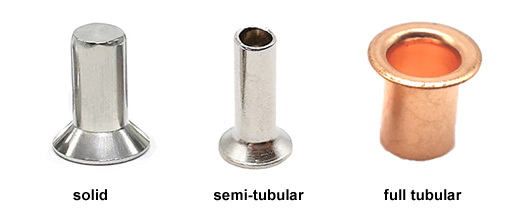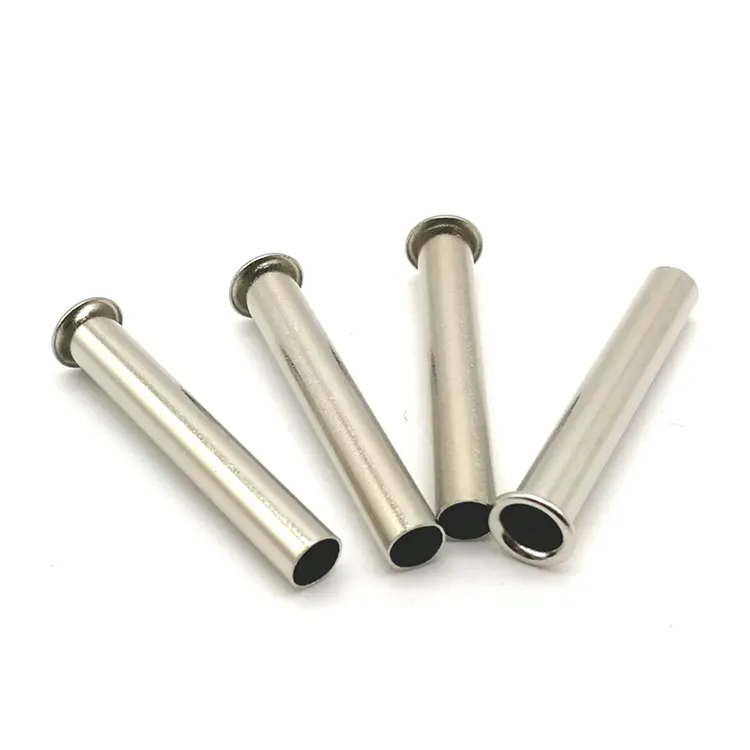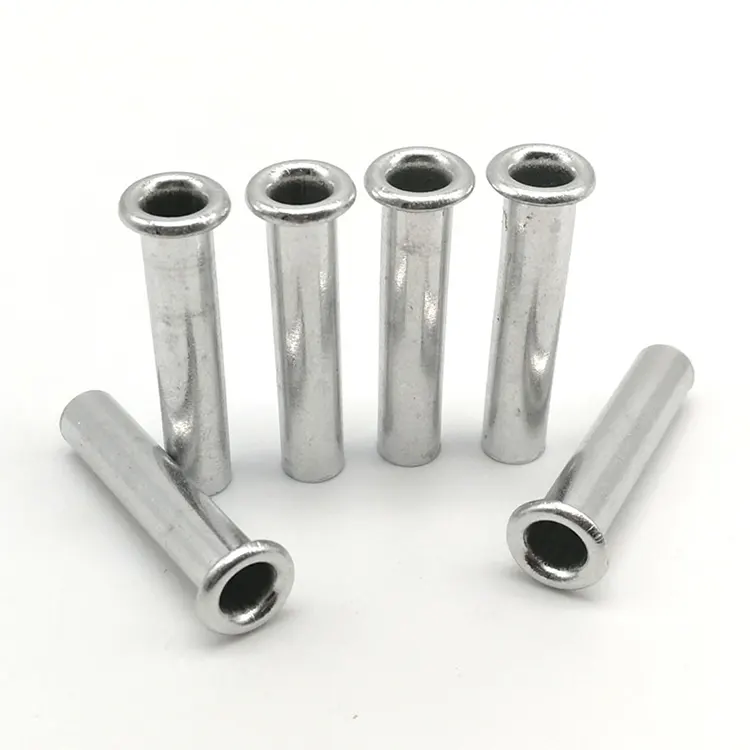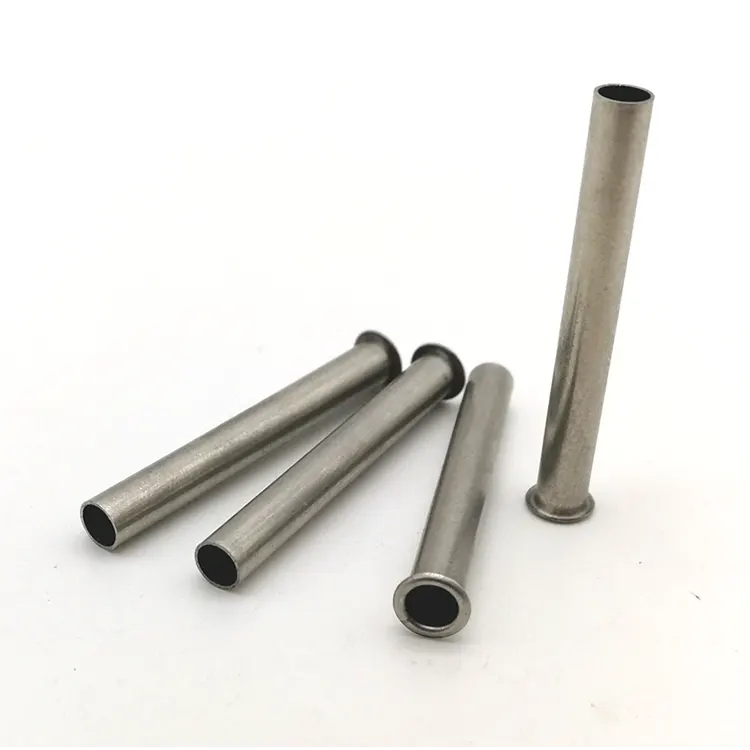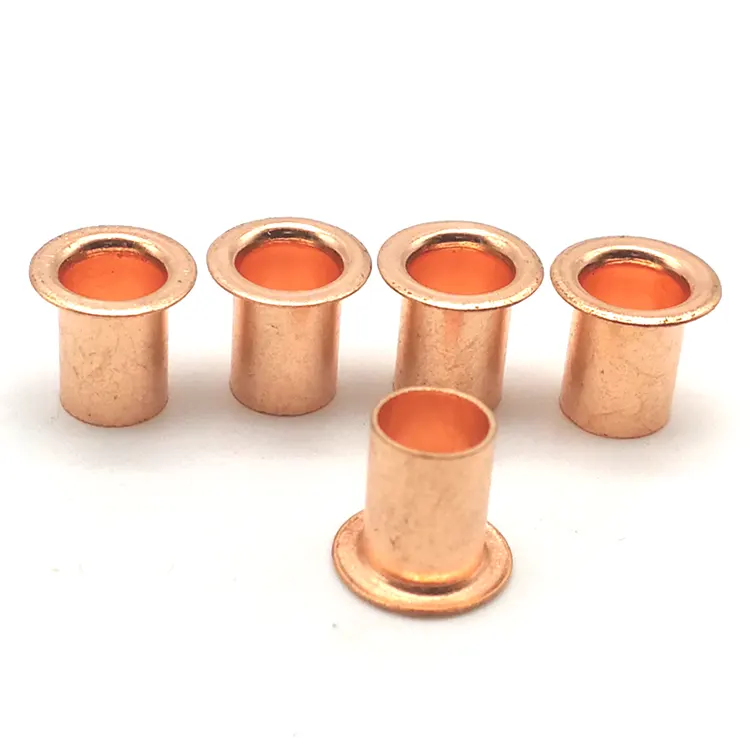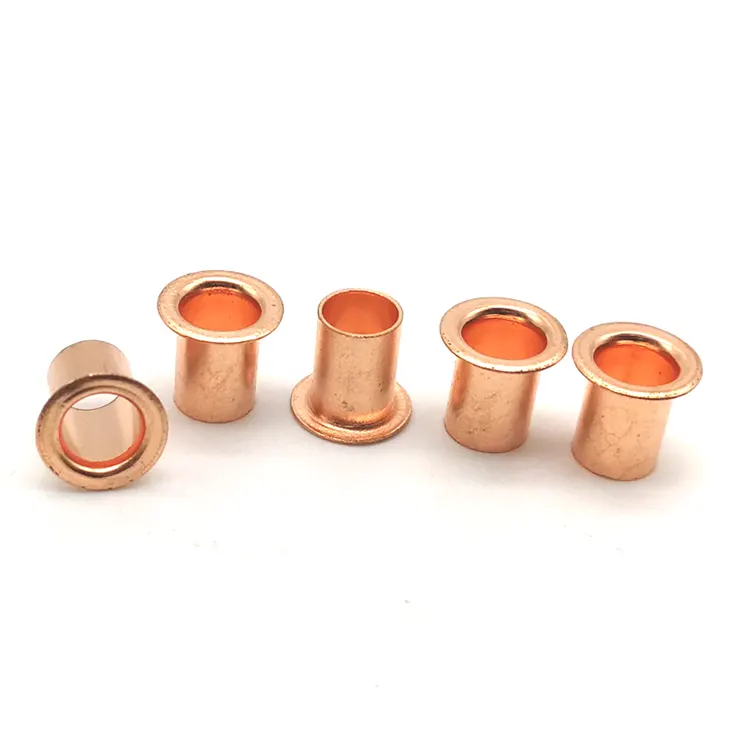Rivetti
As one of professional manufacturer in China, Notin would like to provide you Rivets. And we will offer you the best after-sale service and timely delivery.
What is a rivet?
A rivet is a permanent mechanical fastener used to join two or more materials. Rivets work by inserting a metal pin into an aligned hole and deforming the end, creating a strong, secure, and durable connection. Unlike temporary fasteners like screws, rivets do not rely on threads, but instead form a permanent connection, making them ideal for applications requiring high strength, durability, and vibration resistance.
Classification of Rivets
Rivets are typically categorized by head shape, degree of hollowness, or material.
Based on head shape, rivets can be classified as flat head rivets, round head rivets, countersunk head rivets, mushroom head rivets, universal head rivets, truss head rivets, etc.

Based on degree of hollowness, rivets can be classified as solid rivets, semi-tubular rivets, or full tubular rivets.
Based on material, rivets can be classified as brass rivets, stainless steel rivets, steel rivets, aluminum rivets, copper rivets, etc.
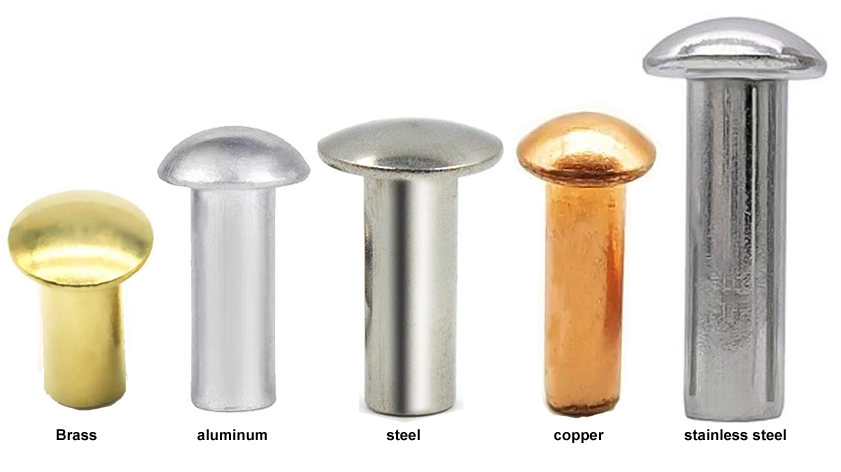
What surface finishes are available for rivets?
Rivet surfaces are typically treated with rust-proofing treatments, primarily electroplating, including zinc plating, nickel plating, chrome plating, tin plating, gold plating, and silver plating. Electroplating is a common rust-proofing method for rivets. It applies a layer of plating to the rivet surface through physical or chemical methods. The plating effectively prevents corrosion and rust, while also providing a certain aesthetic effect.
Another special surface treatment method is head coating. Head coating is performed after the rivet is electroplated. This allows for a variety of colors on the rivet head, achieving an aesthetically pleasing finish.
Aluminum rivets cannot be electroplated, but they can be anodized. Anodizing also allows for a variety of color options, but the unit price is higher than electroplating.
Rust-proofing the rivet surface is crucial, effectively extending the rivet's service life and ensuring a secure connection. Different rust-proofing methods are suitable for different environments and applications, so the choice should be tailored to the specific situation.
- View as
Rivetti del tubo in acciaio
I rivetti del tubo in acciaio sono un tipo di dispositivo di fissaggio in metallo che raggiunge la connessione attraverso la deformazione di timbing. Sono costituiti da un'asta tubolare cavata e una testa del cappuccio finale e appartengono alla categoria di dispositivo di fissaggio cavo nel campo dell'ingegneria meccanica. I metalli nuote offrono questo tipo di rivetti per tubi in acciaio a Dongguan, in Cina, per più di 10 anni. Benvenuti a inviarci il tuo design.
Per saperne di piùInvia richiestaRivetti cavi in acciaio
Nuote Metals è specializzata nella produzione di rivetti cavi in acciaio. Siamo situati a Dongguan, in Cina. Esistono due tecniche principali per la produzione di rivetti di ferro cavo. Uno è usare tubi di ferro, adatti a rivetti più lunghi. Lo svantaggio è che il requisito di quantità minima dell'ordine è relativamente elevato. L'altro è usare tecnici di disegno profondo. Daremo suggerimenti adeguati su quali tecnici utilizzare in base alle circostanze specifiche del cliente.
Per saperne di piùInvia richiestaRivetti a tubo in acciaio inossidabile
I metalli Nuote producono rivetti a tubo in acciaio inossidabile in Cina, i rivetti del tubo in acciaio inossidabile sono uno dei connettori comunemente usati. A causa del design vuoto, sono di dimensioni ridotte e di peso, possono resistere a carichi di pressione e trazione più elevati senza rottura o deformamento e hanno una buona resistenza alla corrosione e resistenza all'ossidazione, ecco perché sono adatti per l'uso in vari ambienti.
Per saperne di piùInvia richiestaRivetti cavi in acciaio inossidabile
I dispositivi di fissaggio svolgono un ruolo cruciale nel settore manifatturiero e i rivetti cavi in acciaio inossidabile, con il loro design strutturale unico, sono ampiamente utilizzati in più settori. Offrono una forte resistenza alla corrosione, un peso ridotto e una maggiore resistenza. Queste caratteristiche consentono loro di resistere a ambienti operativi più severi, estendendo la vita del prodotto e migliorando le prestazioni.
Per saperne di piùInvia richiestarivetti in tubo di rame
I rivetti per tubi in rame sono realizzati principalmente in rame, un materiale di elevata purezza contenente piccole quantità di altri elementi come ossigeno e fosforo. Il rame ha un'eccellente conduttività elettrica ed è spesso utilizzato nei connettori elettrici. Il design strutturale del rivetto tubolare gli consente di deformarsi durante l'installazione per fissare il materiale, creando una connessione sicura. La morbidezza del rame rende i rivetti per tubi in rame meno soggetti a fessurazioni durante l'installazione e fornisce eccellenti proprietà di tenuta. Il rame è anche altamente resistente alla corrosione e mantiene la stabilità in ambienti umidi, acidi e alcalini, prolungandone la durata.
Per saperne di piùInvia richiestaCopper Hollow Rivets
Copper Hollow Rivets è un dispositivo di fissaggio comune, sono realizzati in rame di alta qualità, che offre eccellente conducibilità elettrica e termica e resistenza alla corrosione. In ambienti umidi, un film di ossido si forma naturalmente sulla superficie del rame, fornendo una certa protezione della corrosione ed estendendo la vita del rivetto. Tuttavia, la durezza relativamente bassa di Copper lo rende inadatto a resistere ad alti carichi meccanici. Contatta i metalli Nuote per saperne di più sui rivetti cavi di rame.
Per saperne di piùInvia richiestaWhat are the advantages of rivets over other fasteners?
1. Ease of Installation
Rivets are fast to install, and even fully automated for high-volume applications, resulting in a simple and efficient operation process.
2. Connection Reliability
The riveting process is standardized, with strict quality control, resulting in highly stable connections. Visual inspection allows for quick verification of connection quality.
3. Vibration and Impact Resistance
Rivets connect through deformation or interference fit, providing strong clamping force and excellent vibration resistance, capable of withstanding vibration and shock.
4. Low Cost
Rivets are easy to install and can be fully automated, saving significant labor costs.
What are the advantages and disadvantages of rivets made of different materials?
Aluminum Rivets
Advantages: Lightweight, reduces overall product weight, low cost, suitable for general civilian applications.
Disadvantages: Low tensile and shear strength, unsuitable for high-strength workpieces, prone to electrochemical corrosion when in contact with metals such as stainless steel.
Stainless Steel Rivets
Advantages: Strong corrosion resistance, high hardness, suitable for high-strength workpieces (such as marine equipment)
Disadvantages: Higher cost, typically more expensive than aluminum rivets of the same specification.
Brass and Copper Rivets
Advantages: Excellent conductivity (such as connecting electronic components), good corrosion resistance.
Disadvantages: Higher cost, more difficult to process.
Steel Rivets
Advantages: High hardness, high connection reliability, and wide applicability.
Disadvantages: Compared to other materials, iron rivets are more prone to rusting.
What are the main applications of rivets?
Rivets have a wide range of uses, from small items like a pair of scissors to large items like airplanes and ships, as well as in high-precision medical applications.
Industrial Manufacturing
Rivets are used in a wide variety of industrial fields, wherever there is a need to connect two or more materials.
Electronics
Rivets secure heat sinks and chips, providing both vibration damping and noise reduction, and are widely used in the cooling systems of electronic products such as computers and mobile phones.
Automotive
Rivets are widely used to connect components of automobile bodies and chassis, such as doors and hoods. Their lightweight and corrosion-resistant properties make them an indispensable joining method in automotive manufacturing.
Aerospace
In aircraft manufacturing, rivets are used to connect different fuselage components, such as wings and tailplanes. Millions of rivets create high-strength, corrosion-resistant joints. Aluminum and titanium alloy rivets are often used to connect components of corresponding materials, ensuring stability in extreme environments.
Rivets are used everywhere. The above examples only represent a small number of their applications. We see rivets everywhere in our daily lives, such as on scissors, folding beds, and strollers etc. Rivets can be customized to different sizes and materials depending on the application.
Nuote Metals has specialized in the rivet industry for over a decade. Our factory is located in Dongguan, a city known as the "World Factory," a city with a developed industry and convenient transportation. This allows us to respond quickly when acquiring raw materials and supporting surface treatments, meeting our customers' needs for quick access to samples and bulk orders. We produce 10 million rivets daily and have molds of various specifications, allowing us to produce rivets as small as 0.8mm and as large as 10mm. We welcome your inquiries and visits.






